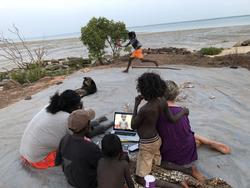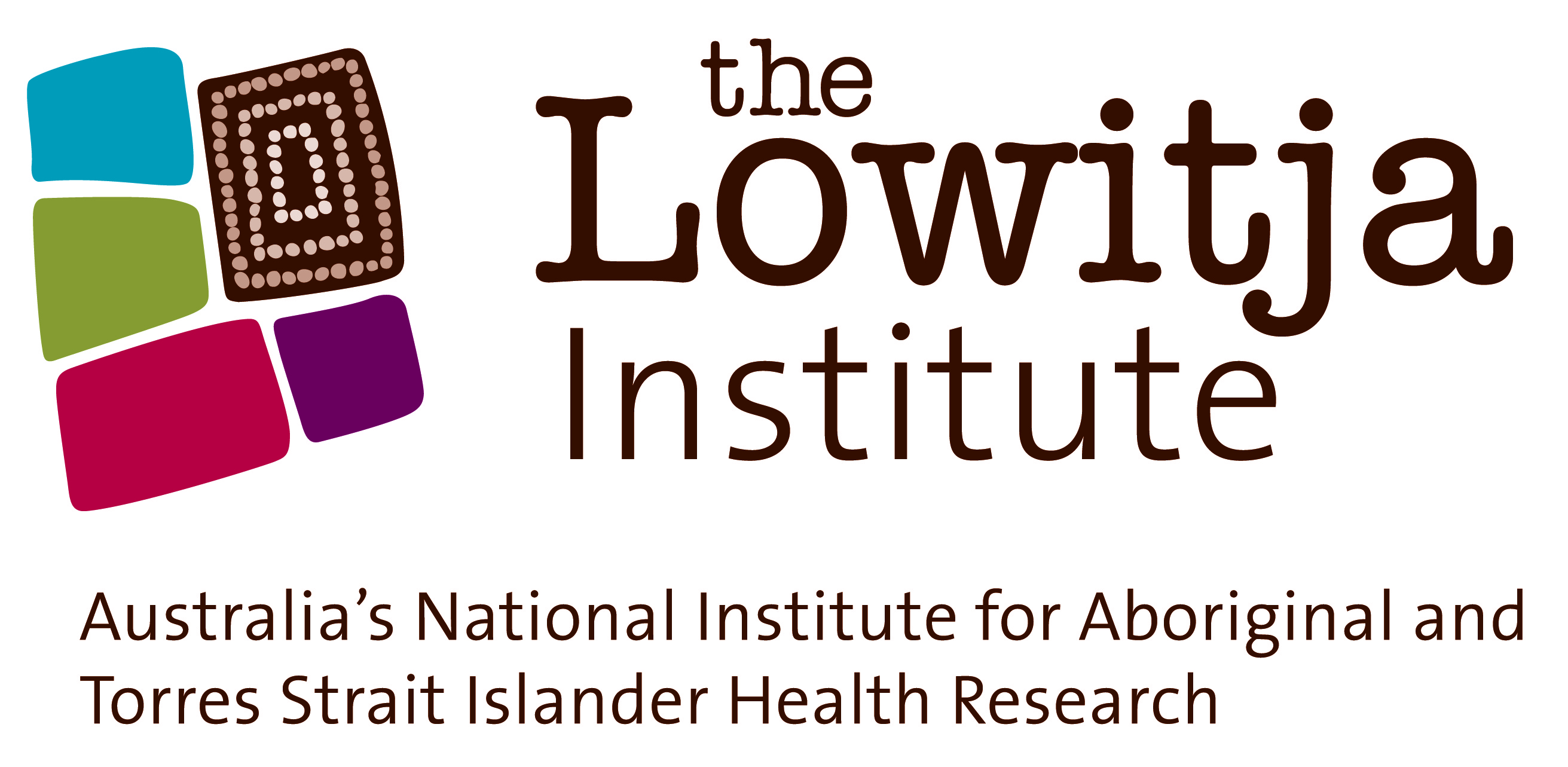Project overview
In 2012 a group of senior Yolŋu women asked to record their concerns about the many early childhood programs coming in to their community. The number of programs had increased following the NT Emergency Response (often referred to as "the Intervention"). The women were concerned about people from outside their community not recognising Yolŋu priorities and knowledge related to early childhood - both the strengths as well as the challenges they face.
Click on the image for a short version of the video to hear from Yolŋu women about their concerns or click here for a longer version.
Since that time, Yolŋu governance and recognition of cultural knowledge and priorities have increased in early childhood services in this community. For more information click here.
.jpg) Collaborative analysis with family members of of video data collected during everyday activities over six years.
Collaborative analysis with family members of of video data collected during everyday activities over six years.
In response to the concerns raised by Yolŋu elders (above) a research project commenced in 2013 and was extended when families asked to continue, supported by funding from the Lowitja Institute from 2016 to 2018. Throughout all stages, the project has engaged with Yolŋu in a collaborative qualitative research process:
- to share Yolŋu knowledge about growing up children – strengths and challenges
- to find out what is important to Yolŋu in growing up children and how families support this development
- to increase other peoples’ understanding of Yolŋu children’s development so assessment processes do not confuse ‘difference’ with ‘deficit’.
See below for further details about the project. More information can also be found here.
More stories and video examples from the research will be added soon but many are ready to share now - click on the menu items at the top of the page to find out more.
Funded by the Lowitja Institute and Charles Darwin University
Project partners and team members
Charles Darwin University:
Anne Lowell, Ḻäwurrpa Maypilama, Yalŋarra Guyula, Abbey Guyula, Lyn Fasoli, Emily Armstrong, Rose McEldowney
Yalu Marŋgithinyaraw, Galiwin’ku:
Rosemary Gundjarranbuy, Megan Yunupiŋu, Jane Garrutju, Dwayne Burrkili
SNAICC: Jenine Godwin-Thompson

Background
In remote northern Australia, Aboriginal cultures and languages remain strong and vibrant. However, this rich and supportive learning environment is often not well recognised by those outside these communities.
Western values and practices continue to dominate early childhood policies and approaches to assessment and intervention in remote Australian Aboriginal communities. However, a deeper understanding of diverse cultural strengths and priorities in early child development is crucial to ensure their strengths and priorities are recognised, valued and supported in any efforts to promote the development and wellbeing of Aboriginal children.
Developmental assessments and interventions can fail to discriminate between ‘difference’ and ‘deficit’ and policies and programs do not always recognise cultural strengths and priorities.
To strengthen the evidence base for more culturally responsive and relevant early childhood services, this study explored the skills and knowledge that Yolŋu (Aboriginal) families consider important and the strategies they use to promote healthy child development and wellbeing.
Research Design
This collaborative, qualitative study was conducted over six years by Yolŋu and other researchers in a remote community in North East Arnhem Land. The majority of the research team were Yolŋu and all stages of the research were guided by senior Yolŋu researchers and a community advisory group - the 'Backbone Committee'. Participants’ preferred language, which was usually a local Aboriginal language, was used in every stage of the research, to ensure consent for participation was genuinely informed and optimal communication was achieved in data collection, as well as in feedback and confirmation of findings.
Project aims
- to find out what is important to Yolŋu in growing up children and how families support this development
- to share Yolŋu knowledge about ‘growing up’ children – strengths and challenges
- to increase other people’s understanding of Yolŋu children’s development so assessment processes do not confuse ‘difference’ with ‘deficit’
Methods
Extensive previous research in this cultural context informed the “Growing up children in two worlds” study design and multiple qualitative methods were incorporated in a collaborative community-based approach.
Longitudinal case studies were conducted with six families over six years, combining in-depth interviews with a form of video-reflexive ethnography. Children and their families engaging in everyday activities – at home, out hunting, at ceremonies – were video recorded approximately every three months from 2013-2015 then approximately every six months from 2016.
Case study family members watched and discussed the videos and these discussions were also recorded. This process elicited detailed interpretations of what was important in child development and child rearing from the perspectives of participants. Numerous further informal discussions with these families occurred when they wished to share additional information and these were also recorded.
As well, we conducted interviews with a wide range of other community members to further explore findings as they emerged from the case studies.
Participant observation and interpretation of the video and interview data by Yolŋu researchers provided further insights. Data from all sources were audio or video recorded then translated into English by Yolŋu researchers and transcribed in collaboration with other members of the research team.
Data collection and analysis occurred simultaneously through a collaborative and iterative process, involving both Yolŋu and other researchers. We analysed data from all sources to identify emerging categories which were elaborated, refined and confirmed through further discussions with Yolŋu researchers, participants and other community members. Qualitative data management software, QSR NVivo 11, was used to assist with data organisation.
Ethical approval was obtained from the Charles Darwin University Human Research Ethics Committee (Phase 1 2013-15 H16025; Phase 2 2016-18: H12136). Approval for the research was also obtained through the relevant Shire Council Local Authority.
For further information click here.
Sharing the findings
This website has been developed to enable wide and continued access to Yolŋu perspectives on key aspects of child development and child rearing identified through this research.
The website aims to provide a training resource to strengthen the cultural competence of early childhood staff working with Yolŋu children and their families. It will also facilitate maintenance and strengthening of cultural knowledge and practice for Yolŋu across the region. The relevance of findings can also be assessed by other cultural groups.
In addition to obtaining informed consent for data collection during the research process, consent was again obtained for video examples and interview data used on the website. The subtitles on videos draw on information from the collaborative analysis with families and/or Yolŋu researchers. Website content was checked in context with participants - including children who may have been babies at the time when the data was collected. As well, the evolving website was checked with a wide range of other community members to ensure that findings presented were relevant and acceptable to other Yolŋu, not only study participants.
Research dissemination and knowledge exchange is also occurring through dissemination of user friendly research reports, journal articles and national and international conference presentations and seminars. See News/Updates page for links and for notifications when new content is added to the website.




